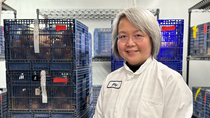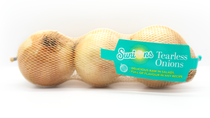Media
A non-molecular approach to improve the quality of food

Elly and her team work on the traits of a wide variety of fruits and vegetables.
Originally from Indonesia, Elly Soreyapranata traveled to the U.S. to pursue her postgraduate studies and began working at BASF in 2005. Since then, she has analyzed and tested different fruits and vegetables, including carrots, watermelons, onions, melons, and tomatoes. Today, she is in charge of researching quality traits in fruits and vegetables, including flavor, color, texture, firmness, shelf life, and nutrition.
Were you always interested in food science? What led you to that specific field?
I received my undergraduate degree in Indonesia in chemistry. Afterward, I got a job in a cigarette company there and stayed for two years. I knew I wanted to go to graduate school, but I didn't know which major to pick.
Initially, I thought I would stay with chemistry, but I realized I didn't want to, I felt it was too theoretical for me. I wanted something more applicable, closer to my daily life. When I learned about food sciences in the cigarette company, I was like, ‘oh, maybe this is the one because there is still a chemistry component to it, but food is more practical’.
What exactly do you do today at BASF?
What I do today, basically, is research the quality of fruits and vegetables. The research itself, the output, is utilized in different ways. One way is to help our breeders improve the accuracy of their selection method. Breeders select fruits and vegetables which contain the trait profiles needed due to market requirements or the conditions of specific locations, among others.
Breeding, in essence, is all about selecting the right trait profiles. Breeders must select products for high disease resistance or achieve specific traits such as a certain color or firmness. They need to select the material that has the trait they need and is relevant to the market they will enter. If they breed for the North American, Central American, or South American market, the traits will be different than they would be for the Asian, Indian, or Australian markets, for example. Therefore, out of the same breeding program, they will need to have different traits.
The research group I lead comes from a non-molecular side. We examine each case from a biochemistry angle and provide a different perspective. We don't work with seeds, we don't work with DNA or RNA, we work directly with the product, the fruit or vegetable itself.
Another important part of our role is to help our product development team and their relationship with the value chain. For this part, we use a lot of post-harvest technology.
Occasionally, we try to help growers find answers. If the problem the grower has relates to the quality of fruit or vegetable in the value chain, we can actually resolve that temporarily by using post-harvest technology. In the past, we tried to help with the ripening of the fruit off the vine by using ethylene. The idea behind this effort is to improve the eating quality.
For example, if fruits are harvested for export, they are usually not fully mature so they can last longer in transit, but they won't have the same taste because they are not ripened.
So that's what we try to do with ethylene.
Is this area of BASF research conducted exclusively at the laboratory in Davis?
Each crop is worked on globally and involves teams from different BASF offices all over the world. We regularly connect to address the main challenges and share information.
What are the main challenges of your research?
Our biochemistry approach presents its own set of challenges because there are a lot of environmental aspects that factor into the traits we consider. This means that a crop grown in location A will have a certain performance and the quality could be different from the one achieved by the same crop grown in location B.
We don’t work with just one crop, but multiple crops. And each crop has its own challenges. With watermelon, for example, the fruit size is one of the main issues. And if we develop a specific trait in watermelon, it cannot be simply transferred to an onion because they are completely different. We need to think specifically about that crop, we need to understand it in depth and understand the trait.
Building knowledge on a specific crop takes a couple of years. And sometimes we decide to change the focus and instead of only considering the fruit, we also consider the dynamics at the leaf level, which means learning about the crop again in a totally different way.
When it comes to onions, for example, we also need to look at the individual bulb. This is because the level of non-uniformity among bulbs for the trait of interest is higher than for crops like tomatoes. By doing this, we try to reduce the risk of non-uniformity.
We can read all the research papers available, but if we don't understand the crop, we won’t get the results we need. We also need to understand the business, which adds another layer of complexity. We need to understand where this product actually goes, what our customer is actually going to use the product for, and the complexity in the value chain, such as how can we maintain the nutrition of the crop.
What do you enjoy the most about your role in researching fruits and vegetables?
There is always a new challenge in each experiment every year and I get to gain more knowledge from each challenge. It is a never-ending learning process that makes the job interesting because I know I have something new to expect in every project, every crop, every trait, and every experiment.
About BASF's Vegetable Seeds business
At BASF, we want to support farmers along the whole value chain – from seed to a successful harvest. BASF is an expert in vegetable seeds and wants to help customers around the globe succeed. This is why we offer a broad portfolio and unique traits that focus on different market situations and consumer demands. Learn more on our Vegetable Seeds website.
For media inquiries and questions, please contact: molly.birman@basf.com
